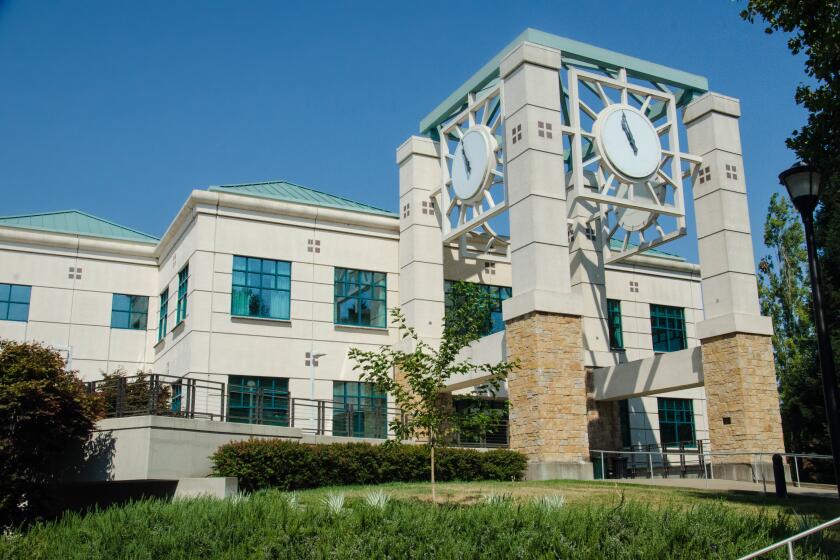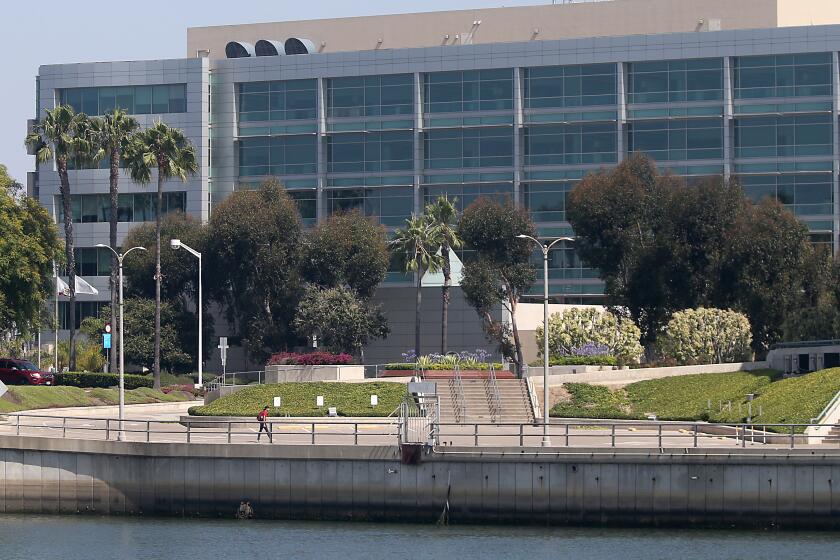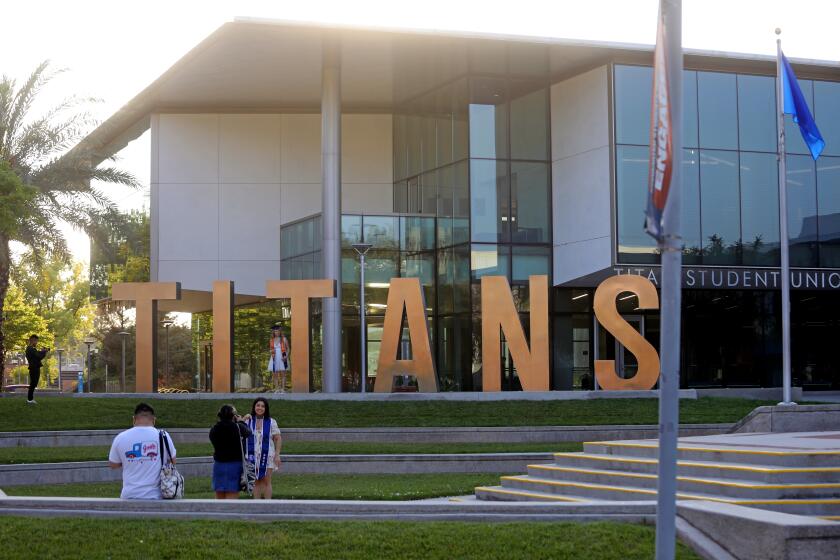Sexual misconduct scandals rocked this California university system. Top leaders escaped scrutiny
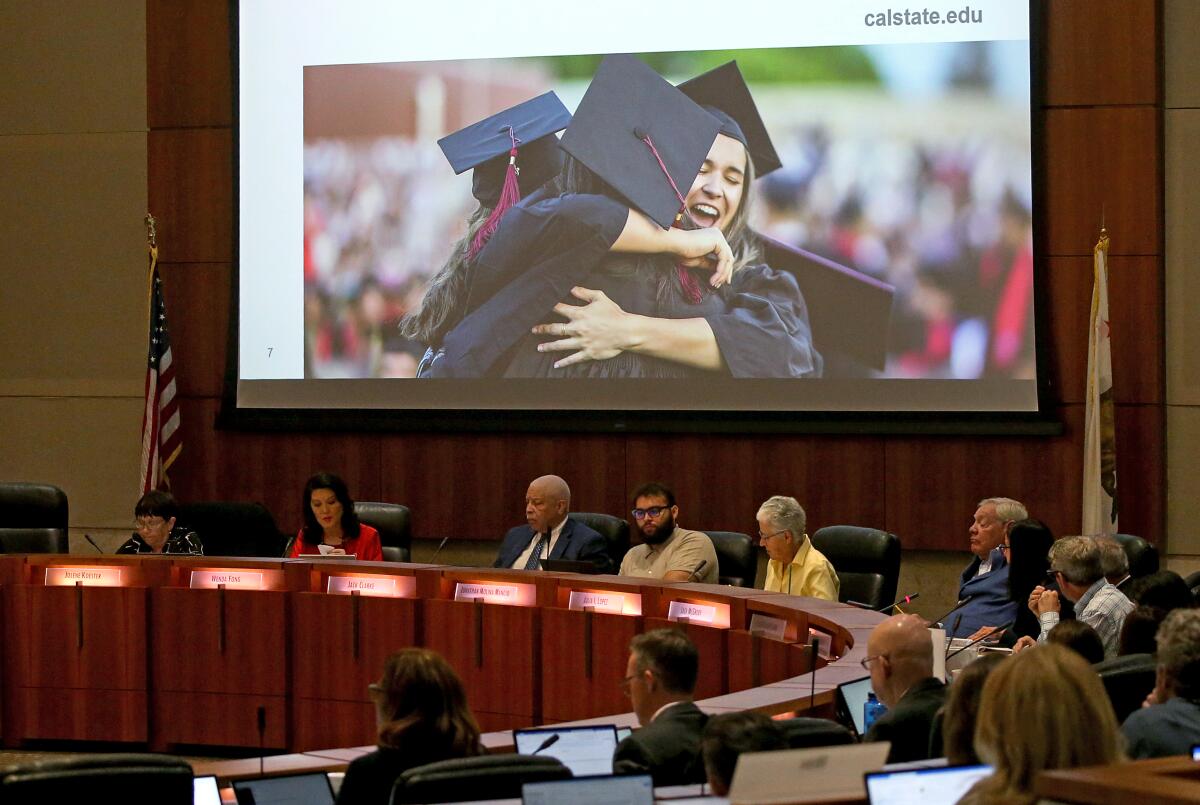
California State University was rocked last year by claims it mishandled sexual misconduct allegations, forcing a chancellor to quit and a university president to step down. Two outside reviews blamed the chancellor’s office and top campus officials for failing to properly investigate complaints or track repeat offenders.
But Cal State’s most powerful leaders — those on the CSU Board of Trustees, which oversees the 23-campus system — largely escaped scrutiny.
Interviews and university records reviewed by The Times show that trustees were warned as far back as 2014 that CSU wasn’t properly monitoring sexual misconduct complaints. As the public outcry grew last year, some trustees claimed they had been in the dark. Yet over nearly a decade, the board approved more than $13 million in settlements related to sexual harassment cases.
University administrators had promised the trustees they would improve their handling of sexual misconduct claims after a 2014 state audit found breakdowns in procedures. But trustees never requested updates in board meetings, nor did they ask about the status of campus reviews that were supposed to flag problems but were not completed, according to interviews and records of minutes from board meetings.
Recent revelations about how California State University handled sexual harassment and workplace retaliation complaints have rocked the nation’s largest four-year public university system.
A second state audit and an outside review ordered by CSU found that administrators failed to investigate accusations of sexual harassment and sexual assault in many instances. Discipline wasn’t always imposed even when wrongdoing was substantiated and shoddy record-keeping persisted, according to the outside findings.
State lawmakers who spoke to The Times said that they don’t trust the board to make changes and are planning additional legislative oversight.
Some experts on higher education also said that the trustees had failed in their responsibility, ceding too much authority to the chancellor’s office, which runs the system and reports directly to the board. A Times review of video from a 2022 board retreat showed that even some trustees appeared confused about who wields ultimate control.
Auditors found problems with how California State University handles sexual harassment complaints and investigations, including not tracking repeat offenders.
Cal State is the nation’s largest four-year public university, serving more than 450,000 students at 23 rural and urban campuses. It is considered a pillar of California’s economy and workforce, graduating roughly 130,000 students a year.
Its Board of Trustees, established in 1960, sets the budget and policies for the system, including admissions, campus infrastructure and collective bargaining agreements with faculty and employee unions.
Nineteen members of the 25-person board are appointed by the governor, and most serve eight-year unpaid terms. The board has six public meetings each year, but trustees don’t mingle with those who attend — access to the dais is blocked with a red-velvet rope — and typically don’t answer questions or directly address concerns raised by students, faculty, employees and others during public comments.
Subscribers get early access to this story
We’re offering L.A. Times subscribers first access to our best journalism. Thank you for your support.
Trustee Douglas Faigin agreed to be interviewed by The Times about CSU’s responses to sexual misconduct claims, and acknowledged that the board should have been more aggressive in its oversight of the chancellor’s office.
“In retrospect, that obviously would have been a good idea,” said Faigin, who joined the board in 2012 and is its longest-serving member.
California State University will be required to publicly disclose the outcome of sexual harassment complaints and investigations.
He echoed written statements by other trustees, saying the board took action once it became aware of the gravity of the sexual harassment problem last year.
“We’re all appalled at what happened and what was allowed to happen,” said Faigin, former president of City News Service, which provides stories to media outlets across the country, including the Los Angeles Times. “We want to let people know we are serious about this and it’s going to change.”
Other trustees did not respond to calls and emails seeking comment on the board’s role in the scandal, or referred The Times to the chancellor’s office.
State Assemblymember Akilah Weber (D-La Mesa) said that no trustee “has been holding the chancellor or the individual campuses accountable.”
“It’s very clear that what we cannot do is take them at their word,” said Weber, who attended a recent legislative hearing on the issue, after which committee leaders accused top CSU officials of “evasive answers and a lack of transparency.”
Assemblymember Mike Fong, who chairs the Higher Education Committee, said the trustees should be more proactive.
“The CSU trustees are the first line of oversight. ... They can and should be demanding that the California State University system implements the recommendations [from the audit] immediately and promptly, and with fidelity,” said Fong (D-Alhambra).
In recent years, the board had been made aware of troubling claims of wrongdoing, such as long-standing accusations of sexual misconduct at San Jose State that prompted an investigation by the U.S. Justice Department and led to a payout of more than $7 million to students and employees.
CSU paid $600,000 to settle a former Sonoma State provost’s legal claim that she suffered retaliation after reporting sexual harassment by the university president’s husband.
The board was also aware of a $600,000 settlement involving a Sonoma State provost who accused the school’s president of retaliation after she reported other women’s accusations of harassment by the president’s husband. And the board knew about a $2.75-million settlement with a Cal State L.A. athletics department official who accused the former athletic director of sexual harassment.
Sign up for This Evening's Big Stories
Catch up on the day with the 7 biggest L.A. Times stories in your inbox every weekday evening.
You may occasionally receive promotional content from the Los Angeles Times.
The issues became a public crisis for the trustees last year when news reports disclosed that then-Chancellor Joseph I. Castro had quietly negotiated a settlement when he was president of Fresno State with a top administrator accused of sexual harassment, bullying and workforce retaliation. Castro, who said he had relied on the advice of former Chancellor Timothy P. White and the CSU general counsel’s office, resigned amid the outcry.
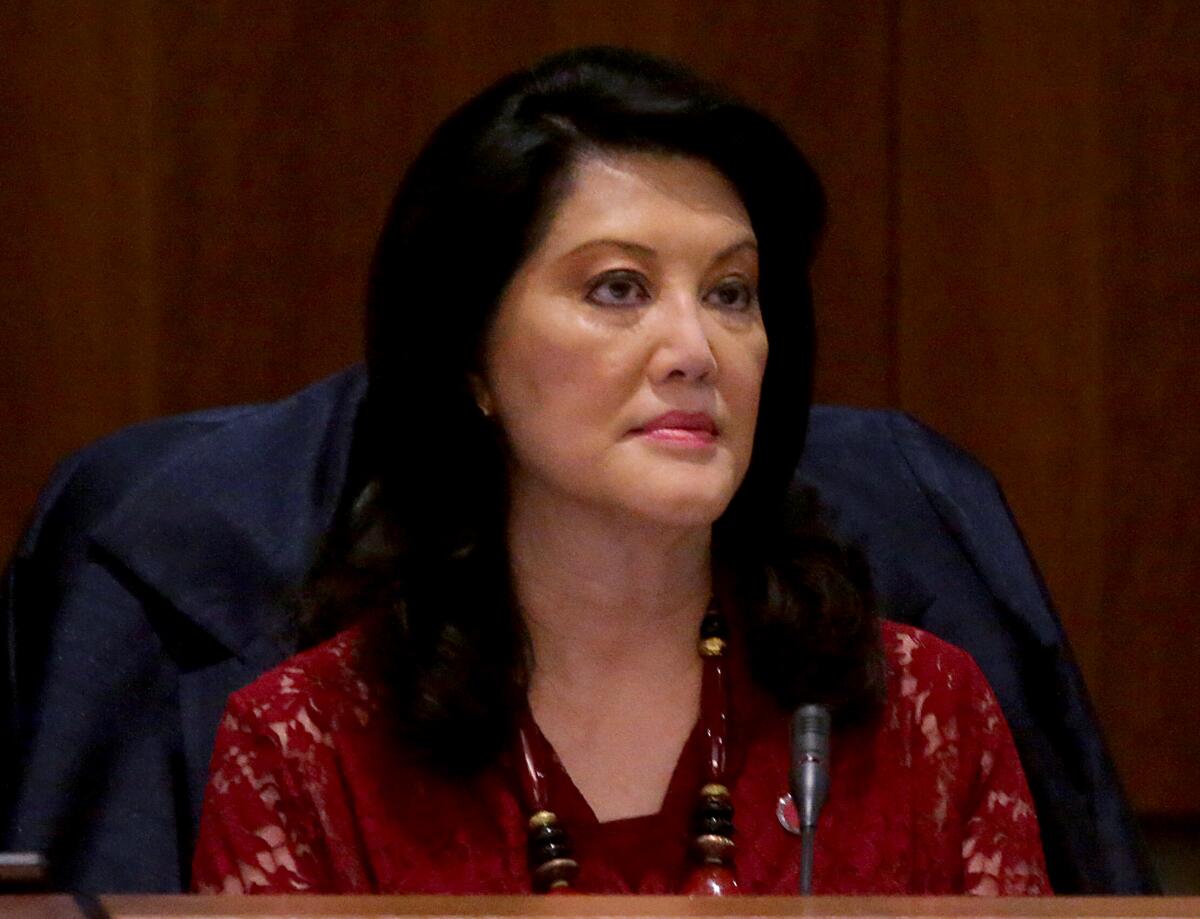
Board Chair Wenda Fong, who has served as a trustee since 2018, said in a statement that the board took “prompt action” after the controversy with Castro and ordered “the most comprehensive, systemwide Title IX assessment ever conducted.”
Title IX is a federal law prohibiting sex discrimination. Most university employees are required to report allegations of sexual misconduct, including harassment and retaliation.
“No other public or private university has examined Title IX [policies] on this scale,” said Fong, a longtime television executive.
“Transforming culture is not easy or quick. It takes time and significant resources,” her statement said.
Since the ensuing scandal became public, Cal State has paid roughly $2 million for the systemwide review and other services, including hiring experts in crisis communications and consultants to advise the board on its leadership. The board also recently approved spending $36 million to hire additional staff members to address sexual misconduct, discrimination and retaliation complaints.
At a recent meeting, Fong said she requested that the chancellor’s office provide status updates in future meetings on how CSU is tackling recommendations from the recent reports in order to “regain the trust” of the community and the Legislature. The outside report by the law firm Cozen O’Connor, for example, called for creating a pool of trained investigators to assist campus personnel.
This year’s state audit recommended about two dozen reforms, including improving record keeping and tracking of cases throughout the system and requiring campuses to document when employees have been accused repeatedly of misconduct.
Former Chair Lillian Kimbell has served on the board since 2014, when systemwide flaws were presented to trustees. An attorney, she has worked as a legal counsel for a Democratic think tank and a media group. Her husband was a top aide to Gov. Jerry Brown, who appointed Kimbell to the board.
Kimbell did not respond to inquiries from The Times about whether she believed the board should have pushed for change sooner.
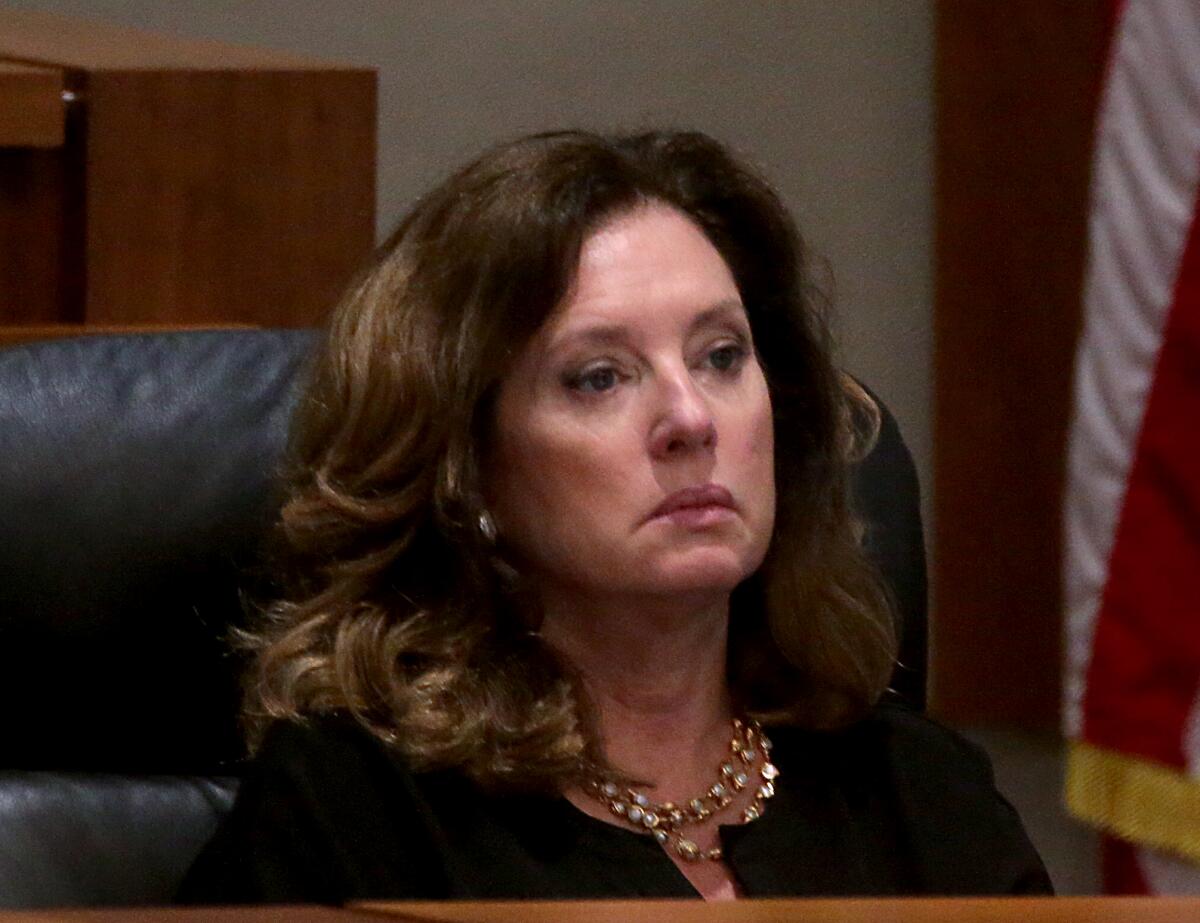
Other veteran trustees include Lateefah Simon, a longtime civil rights activist who sits on the board of Bay Area Rapid Transit and has served as an advisor to Gov. Gavin Newsom. She is now running for Congress.
Simon, who was appointed as a CSU trustee in 2016, declined to speak with The Times about her role on the board. A spokesperson for her congressional campaign referred a Times reporter to the chancellor’s office.
Trustee Jean Picker Firstenberg, a longtime president and chief executive of the American Film Institute, also joined the board in 2016. She too declined to comment and directed The Times to the chancellor’s office, saying she didn’t “think individual trustees should speak with the press.”
Other trustees include the lieutenant governor, the speaker of the Assembly, the state superintendent of public instruction, the CSU chancellor and the governor, who are all voting members.
Women and trans and nonbinary cadets at Cal State University Maritime Academy describe a pervasive culture of misogyny, sexual abuse and harassment.
As an ex officio trustee when he was lieutenant governor, Newsom attended the 2014 board meeting in which the state audit was discussed.
That audit included an analysis of two CSU campuses — Chico State and San Diego State — and found that faculty and students were poorly trained on reporting procedures around sexual misconduct allegations, and that campus leaders didn’t regularly update students who filed complaints on the status of investigations.
CSU leaders vowed to improve record keeping of complaints and track them across all 23 campuses to spot breakdowns, identify trends and ensure that accusations were properly investigated and appropriate discipline was imposed.
“It’s not lost on any of us the significance of this issue and ... our resolve to address it,” Newsom said at the 2014 meeting.
As governor, he now serves as president of the CSU board and has appointed multiple trustees. His office did not respond to specific questions about his role on the board and said he was unavailable for interviews due to his tight schedule.
University of Utah law professor Amos Guiora, who has written a book about the mishandling of sexual misconduct cases at university campuses, said the trustees’ lack of oversight puts students and employees at risk.
They’re “enablers” said Guiora, who has interviewed survivors of sexual misconduct, including former USA Gymnastics athletes who were assaulted by Larry Nassar — the onetime team doctor sent to prison two decades after female gymnasts, many underage, began complaining about him.
For Melanie Gasca, a Cal State L.A. senior majoring in English, the board’s promises for reform have come too late. Gasca filed a sexual assault complaint last year against another student, and recently learned that no wrongdoing was found. She said she doesn’t believe there was a thorough investigation or that the trustees will fix the system that she feels let her down.
“What they’re preaching … is not what we’re getting,” she said. “We are real people being traumatized by an institution that is supposed to guide us.”
Cal State L.A. said it does not comment on sexual misconduct cases due to privacy rights.
CSU officials have repeatedly said they won’t discuss personnel issues, but have vowed to do all they can to protect students.
Settlement agreements over employment issues, including those related to sexual misconduct, are made on behalf of the board, and travel records and public documents show that trustees regularly visit campuses and serve as representatives for the university.
The board had for years received summaries of sexual harassment and sexual assault litigation during the open session of board meetings. But it changed course in 2019 and now only discusses that litigation in closed session, CSU records show.
The reason for the change, CSU general counsel Andrew Jones told The Times last year, was that “we wanted to more fully inform the [trustees] and be able to engage in meaningful discussions with them on these important topics.”
Silas Abrego, who served as a trustee from 2015 to 2021, recalled the board and CSU choosing to pay settlements to resolve problematic sexual harassment complaints rather than litigate the cases.
“We didn’t delve into the details,” he said in an interview.
He did not recall ever receiving a systemwide sexual harassment report showing information such as investigative rates and case outcomes.
In retrospect, Abrego said, he and his colleagues should have been more aggressive.
Experts said an independent investigation should have been conducted into claims against Cal State Fullerton’s president, who denied doing anything wrong.
In recent years, the board has met regularly at retreats to examine its role.
Last November, two paid consultants including Roberta Achtenberg — a former trustee and mentor to Kimbell — led the board in an hours-long retreat. Video shows trustees discussing the extent of their authority in relation to the chancellor and their power to intervene in campus matters.
“You don’t want a board to micromanage the chancellor’s office,” said William G. Tierney, a USC professor emeritus and expert on higher education governance. “But what we have had, up until now, is the exact opposite.”
Tierney said he believes that the board has been acting as an arm of the chancellor’s office instead of a separate oversight body.
State lawmakers are demanding that the board become better stewards of the vast university system.
The Assembly Higher Education Committee is preparing a report on policy recommendations to “root out sexual harassment and sexual misconduct,” Assemblymember Fong said. It is intended to guide legislation that lawmakers plan to introduce next session that will require more extensive reporting and additional actions from CSU.
Newsom also recently signed a bill into law that will require CSU to publicly disclose the outcome of sexual harassment cases through annual reporting. The bill was introduced by state Sen. Bill Dodd (D-Napa) following Times investigations that detailed breakdowns at two CSU campuses in his district— Sonoma State and CSU’s Maritime Academy.
To help ensure accountability, Tierney suggested the state should appoint an independent ombudsman to act “on behalf of the citizenry” to assess the relationship between the board and the chancellor, and the board and the public.
“This is not simply an example of one or two bad board members. … This is a cultural problem,” he said.
“We gave them a long leash, and they failed.”
More to Read
Sign up for This Evening's Big Stories
Catch up on the day with the 7 biggest L.A. Times stories in your inbox every weekday evening.
You may occasionally receive promotional content from the Los Angeles Times.
